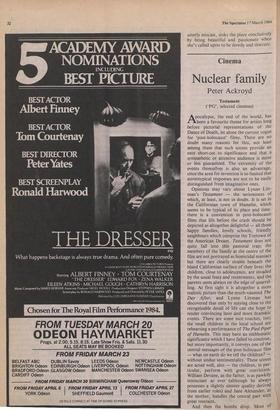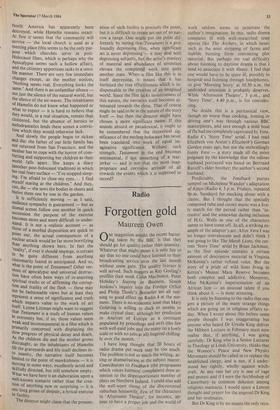Cinema
Nuclear family
Peter Ackroyd
Testament (PG', selected cinemas)
Apocalypse, the end of the world, has been a favourite theme for artists long before pictorial representations of the Dance of Death, let alone the current vogue for 'post-holocaust' films. There are no doubt many reasons for this, not least among them that such scenes provide an easy short-cut to significance and that a sympathetic or attentive audience is more or less guaranteed. The extremity of the events themselves is also an advantage, since the area for invention is so limited that stereotypical responses are not to be easily distinguished from imaginative ones.
Opinions may vary about Lynne Litt- man's Testament — the seriousness of which, at least, is not in doubt. It is set in the Californian town of Hamelin, which seems to be typical of its place and time. there is a convention in post-holocaust films that life before the crash should be depicted as altogether delightful — all those happy families, lovely schools, friendly neighbours which comprise the Toytown of the American Dream. Testament does not quite fall into this pastoral trap; the members of the family at the centre of the film are not portrayed as homicidal maniacs but there are clearly strains beneath the bland Californian surface of their lives: the children, close to adolescence, are invaded by the usual fears and resentments, and the parents seem always on the edge of quarrel- ling. At first sight it is altogether a more realistic picture than the much-vaunted The Day After, and Lynne Littman has discovered that only by staying close to the recognisable detail of life can she hope to render convincing later and more dramatic events. There are some nice touches, too; the small children in the local school are rehearsing a performance of The Pied Piper of Hamelin. This may have an emblematic significance which I have failed to construe, but more importantly, it conveys one of the central messages of the post-holocaust film — what on earth do we tell the children? — without undue sentimentality. These scenes are acted well, also — the children, in par- ticular, perform with great conviction. William Devane, as the father, is as pawkily insouciant as ever (although he always possesses a slightly sinister quality derived from earlier roles) and Jane Alexander, as the mother, handles the central part with great restraint.
And then the bombs drop. Most of
North America has apparently been destroyed, while Hamelin remains intact. At first it- seems that the community will survive — the local church is used as a meeting place (this seems to be the only pur- pose which churches serve in post- Holocaust films, which is perhaps why the Apocalypse seems such a hollow affair), and the citizenry apportions tasks in a sensi- ble manner. There are very few immediate changes except, as the mother notices, 'Nothing seems real. Everything looks the same.' And there is an unfamiliar silence not just the silence of the natural world, but the silence of the air-waves. The inhabitants of Hamelin do not know what happened or what to expect — it is hard to believe that they would, in a real situation, remain thus cloistered, but the absence of heroics or melodramatics lends these scenes a convic- tion which they would otherwise lack.
And slowly the people begin to sicken
and die: the father of our little family has not returned from San Francisco, and the mother has to cope with the horror of com- forting and supporting her children as their world falls apart. She keeps a diary (another post-holocaust tradition) in which her real fears surface — 'I've stopped sleep- ing. I'm afraid to close my eyes... I find Myself staring at the children.' And they, too, die -- she sews the bodies in sheets and buries them one by one in the garden.
It is sufficiently moving — as I said,
audience sympathy is guaranteed — but as dismal scenes follow one another in quick succession the purpose of the exercise becomes more and more difficult to under- stand. It is not a realistic account — as those of a morbid disposition are quick to Point out, the actual consequences of a nuclear attack would be far more horrifying than anything shown here. In fact the if ever it should impinge, is certain to be quite different from anything customarily feared or anticipated. And so, What is the point of Testament? Other ver- sions of apocalypse and universal destruc- tion have often been ways of re-asserting spiritual truths or of affirming the corrup- tion and fraility of the flesh — these may not be fashionable views but at least they represent a sense of significance and truth Which imparts value to the work of art itself. Lynne Littman might want to suggest that Testament is a study of human values in extremity but, if so, those values seem weak and inconsequential in a film which is primarily concerned with displaying the slow progress of physical decay and death. As the children die and the mother grows distraught, as the inhabitants of Hamelin fill the graveyards and life itself declines in- to inanity, the narrative itself becomes limited to the point of mawkishness — it is moving in some ways, excellently acted and skilfully directed, but still somehow empty.
What we have here is an elaboration upon a well-known scenario rather than the crea- tion of anything new or surprising — it is one long groan of despair,, a lyrical exercise in futility.
The director might claim that the present- ation of such futility is precisely the point, but it is difficult to create art out of so nar- row a range. One might put the point dif- ferently by noting that Testament is a pro- foundly depressing film, when significant art is never depressing — it may deal with depressing subjects, but the artist's mastery of material and abundance of invention elevate the completed work into quite another state. When a film like this is in itself depressing, it means that it has forfeited the true effectiveness which is in- dispensable to the creation of an imagined world. Since the film lacks inventiveness of this nature, the narrative itself becomes at- tenuated towards the close. That of course might be said to be in the nature of the story itself — but then the director might have chosen a more significant theme. If this sounds absurd or paradoxical, it ought to be remembered that the theoretical sig- nificance of the nuclear holocaust has never been translated into work of equal im- aginative significance. Without such strength, Testament in the end becomes sentimental, if not something of a tear- jerker — and is not that the most inap- propriate and corrosive attitude of all towards the events which it is supposed to record?















































 Previous page
Previous page